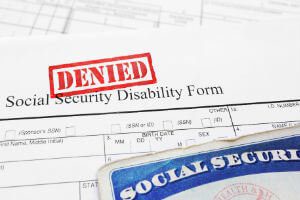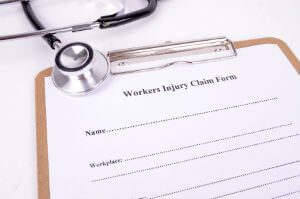TAP TO CALL
Hablamos Español
 When you apply for Social Security Disability benefits, one of the main things evaluators will look at is your functional limitations. These are the limitations you experience to perform physical or independent activities due to a disability.
When you apply for Social Security Disability benefits, one of the main things evaluators will look at is your functional limitations. These are the limitations you experience to perform physical or independent activities due to a disability.
Before you begin the Social Security Administration’s (SSA) application process, preparing answers for questions about your disability may help you get the benefits you need. Lynch Law Firm, PC’s knowledgeable New Jersey Social Security disability lawyer can help you understand what you need to know before you file a claim with the SSA.
Below, we have provided several questions that you may be asked by the SSA about your functional limitations. If you or someone you love has been denied Social Security Disability benefits, contact us to schedule a free, no obligation consultation.
When applying for disability benefits, the SSA will evaluate your condition to determine the type and amount of work you are capable of doing. The SSA will then determine the functional limitations you experience with your disability through the following questions:
Your ability to lift heavy objects can determine the types of work you are capable of doing. The SSA may ask you the amount of weight you are able to frequently or occasionally lift.
The SSA may also ask you if you are able to sit or stand for certain periods of time. This limitation may affect your ability to work in several types of occupations. The evaluator assigned to your case may consider if you need to take breaks or change positions between sitting and standing while you work.
Hearing or vision impairment may affect your ability to perform certain jobs or handle specific equipment, such as heavy machinery or using a telephone.
If you suffer from profound hearing or vision impairment, it may prevent you from working in many types of occupations. The SSA will consider these factors when reviewing your functional limitations.
Applicants who suffer back, knee, neck or spinal cord disabilities may find it difficult to perform manual labor jobs that require several types of movements. This includes:
Many jobs require that you are able to reach overhead and forward to grab objects. If you suffer from a degenerative type of disability, such as arthritis or degenerative disc disease, it may affect your ability to perform reach-related tasks.
The SSA may consider if your disability limits your ability to grasp objects and perform dexterous finger movements. Many sedentary jobs require this type of movement, such as office or driving-related jobs.
If you suffer from a mental or psychiatric condition, the SSA may consider how this affects your ability to work. This may include conditions such as depression, bipolar disorder or anxiety. The SSA evaluator will examine how your condition may affect your ability to follow instructions, remember specific details or retain new information.
Many claimants who suffer a disability have days where they experience less effects from their disability. Likewise, claimants may also experience days where the effects of their disability are intensified and are prevented from performing even the simplest of tasks.
If the severity of your disability may vary on certain days, you should inform the SSA by noting it in your application. Tell the evaluator assigned to your claim about the limitations you experience on your worst day to clear any misconceptions about your physical or mental capabilities.
To prove the limitations you suffer on good or bad days, try to provide the following evidence to your evaluator:
Obtaining Social Security Disability benefits can be difficult for applicants who suffer from a severe disability. If you or a loved one needs legal assistance with a Social Security Disability application, contact Lynch Law Firm, PC for qualified representation.
We can discuss your disability and the impairments you suffer during a free, no obligation consultation. We work on a contingency fee basis, which means you only need to pay us if we help you get the benefit you need.
Call (800) 518-0508 today.
 Social Security Disability benefits provide physically and mentally impaired individuals with the funds they need to support their basic living expenses when they are unable to maintain substantial employment. These benefits are also available for children if they meet certain requirements outlined below.
Social Security Disability benefits provide physically and mentally impaired individuals with the funds they need to support their basic living expenses when they are unable to maintain substantial employment. These benefits are also available for children if they meet certain requirements outlined below.
The Lynch Law Firm, PC’s Social Security Disability attorneys in New Jersey are committed to helping you and your family receive the full amount of benefits you need. If you need qualified legal help with your application, contact us to discuss your child’s claim.
There are three ways in which children can qualify for disability benefits:
Children under the age of 18 who suffer from a physical or mental disability may be eligible for Supplemental Security Income (SSI) if they meet the following requirements:
SSI benefits are available for children who meet the SSA’s disability requirements and belong to a family that has little income or access to financial resources.
Once a disabled child reaches the age of 18, he or she will be reevaluated for disability benefits and must meet the SSA’s adult definition of disability to continue to receive SSI benefits.
Children may also be eligible for Social Security Disability payments if they have a parent, stepparent or adoptive parent who is receiving Social Security retirement payments or Social Security Disability Insurance (SSDI) or who was entitled to one of those benefits before he or she died.
When a child receives disability payments based on a parent’s record, he or she receives auxiliary or dependent benefits. Some children who may qualify to receive these benefits include the claimant’s:
Typically, a child who is eligible for dependent benefits is entitled to receive up to 50 percent of the claimant’s monthly benefit amount.
To receive dependent benefits, the child must be unmarried and under the age of 18. He or she can receive these benefits up to the age of 19 if he or she is still in high school.
A young adult who is older than 18 and became disabled before reaching the age of 22 may qualify for “adult child” benefits if a parent is receiving Social Security retirement or disability benefits or who has died and was eligible for either benefit. This is essentially an extension of dependent benefits, as it is based off the parent’s qualifying earning record. .
“Adult child” benefits can be continued for as long as the disabled young adult continues to meet the SSA’s definition of a disabled adult.
These benefits can be provided to adult children who are much older than 18 or 22 years old. This occurs when the disabled child’s parent does not start collecting Social Security benefits until retirement. When this happens, the claimant’s disabled child becomes eligible for the “adult child” benefits.
Often, recovering Social Security Disability benefits for children can be a complicated process. An experienced lawyer with the Lynch Law Firm, PC can help you with your child’s claim if he or she has been denied disability benefits. We will provide a free, no obligation consultation to review your claim.
We provide all of our services on a contingency fee basis, which means we only get paid if we help you and your family obtain the Social Security Disability benefits you deserve.
Complete a Free Case Evaluation form to get started.
 Social Security Disability Insurance (SSDI) is available for qualifying individuals who can no longer work full-time due to a disabling medical condition. To qualify for these monthly financial benefits, you must meet certain work and medical requirements.
Social Security Disability Insurance (SSDI) is available for qualifying individuals who can no longer work full-time due to a disabling medical condition. To qualify for these monthly financial benefits, you must meet certain work and medical requirements.
Our experienced New Jersey SSDI lawyers at the Lynch Law Firm, PC can help explain eligibility criteria and the application process for obtaining benefits. We offer a free, no-obligation consultation to review the circumstances of your condition and to determine if you may have a viable claim. If you need assistance in filing an application or appealing a denial, contact our firm to get the help you need.
The SSDI program is based on the accrual of work credits, which are acquired as you pay Social Security taxes. Credits are earned based on your annual wages or self-employment income. Each year, you can earn up to four credits.
In 2017, one credit equals $1,300 of your quarterly income. This means that your annual income must be at least $5,200 for you to receive four credits for the year.
Depending on your age when you apply for SSDI benefits, you will need between 20 and 40 credits to qualify for benefits. You must have acquired 20 of these within ten years from the date you became disabled if you are 32 or older.
SSDI benefits are provided for those with a disabling medical condition that is terminal or expected to last for a year or more. This disabling condition must prevent you from being able to perform the essential functions of your job or any other job in another field.
One way to establish that you have a disabling condition is to show that your condition meets or equals a listing in the Social Security Administration’s (SSA) Blue Book Listing of Impairments. This book lists several types of medical impairments and the requirements you must meet to be considered disabled for each.
The Blue Book includes a list of medical conditions for each of the major body systems. If you meet the requirements for one of these listings, you should be considered disabled. If your condition is not on this list but is as severe as another impairment that is listed, you may be able to qualify for benefits on that basis.
If your condition does not meet or equal one of the listings, the SSA will determine if your disabling condition prevents you from working. It considers whether you can perform work you did previously or any other type of work, based on the following factors:
If you are unable to do the work you did previously or another type of work and have the required work credits, you should be approved for SSDI. Those who meet the medical requirements but do not have enough work credits may be able to receive benefits though Supplement Security Income.
SSDI claims can be complex and may require the assistance of an experienced SSDI lawyer. We can review your claim during a free consultation to determine if you meet the requirements to qualify for SSDI. Our injury lawyers can also help appeal denied claims, as most SSDI claims are denied on the first try.
We work on a contingency fee basis, so if your claim is not approved, you will not owe us anything.
Call us at (800) 518-0508 to get started.
 Supplemental Security Income (SSI) is provided to individuals who have a disability and meet certain income and resource limits. There are strict requirements that must be met in order to qualify for benefits.
Supplemental Security Income (SSI) is provided to individuals who have a disability and meet certain income and resource limits. There are strict requirements that must be met in order to qualify for benefits.
Our New Jersey Social Security disability lawyers are familiar with the requirements that claimants must meet in order to obtain benefits. We help at every stage of the process, from the initial application to appeals. Contact us today for a free, no obligation consultation.
Before applying for SSI, it is important to understand the eligibility requirements.
In order to be eligible for SSI benefits, a person must be one of the following:
A person who is under the age of 65 is considered disabled for the purposes of receiving SSI if he or she suffers from a physical or mental impairment that is expected to last or has lasted for at least 12 months or will result in death. The condition must prevent the person from performing substantial gainful activity, which is defined as making $1,170 per month or more, as of 2017.
In addition to these medical requirements, a claimant’s income and resources cannot exceed certain limits.
The SSA income requirements take into account:
A single person cannot have resources in excess of $2,000, and a married couple cannot have resources in excess of $3,000.
Resources that are counted by the SSA include:
There are certain exemptions, including your home, one vehicle, and household goods and personal effects.
If you believe you may qualify for benefits, you should apply as soon as possible. The application process may seem straightforward, but any errors or missing information can easily derail your claim.
There are several methods available to apply for benefits, including the following:
All applicants have the right to appoint a legal representative to help you with your case. The person you appoint can:
You should strongly consider hiring a competent disability lawyer to help with your claim, as we can help ensure your application is complete, accurate and submitted on time. Additionally, because many applicants are initially denied, an attorney will be valuable in guiding you through the complicated appeals process.
You will need to provide a lot of information on your application about your employment history, social life, contact information, resources and disability.
Having a legal representative help you collect and organize this information can be invaluable. Some documents you will need include:
Your legal representative may gather these documents prior to completing the application so that your initial application can be as complete as possible.
However, if some of the information is not available or you accumulate additional documentation while your claim is pending, your legal representative can supplement information in the application.
If you need assistance in filing for SSI benefits, the Lynch Law Firm, PC can help. We are familiar with all aspects of disability law and put this knowledge to use in every case.
We can examine your claim, help you determine if you are eligible for benefits and guide you through every step of the process. We will help gather your medical records and other evidence to help support your claim.
Our personal injury lawyers work on a contingency fee basis and only get paid if you get benefits. We can help you wherever you are in the SSI application process, whether you are applying for benefits for the first time or if you have already been denied benefits.
To schedule a free and confidential evaluation of your claim, call (800) 518-0508 .
 If you are a New Jersey worker who has been injured on the job or who has fallen ill due to job-related conditions, you may be entitled to workers’ compensation benefits. Here you will find important information about the timelines for filing a claim.
If you are a New Jersey worker who has been injured on the job or who has fallen ill due to job-related conditions, you may be entitled to workers’ compensation benefits. Here you will find important information about the timelines for filing a claim.
If you have experienced delays or denials for workers’ compensation in New Jersey, you need a skilled workers comp attorney on your side. The New Jersey workers’ compensation lawyers at Lynch Law Firm, PC will work to secure the compensation you deserve.
According to New Jersey law, workers must be incapable of working for seven days prior to becoming eligible for temporary disability benefits. This timeline includes holidays and weekends, and the seven days do not have to be consecutive. Once your claim is approved, benefits will be issued retroactively to the first day you had to miss work due to injury or illness.
This timeline does not apply to medical benefits or benefits for permanent disability. If approved, those benefits are given regardless of how many workdays were missed.
In New Jersey, a two-year statute of limitations applies for cases involving workers’ compensation. Claim petitions must be made within two years from the date when the injury occurred or the last compensation payment – whichever came last. Authorized medical care is considered to be a type of compensation payment.
Claims involving occupational illnesses, such as hearing loss, lead poisoning or asbestosis, must be made within two years of the date the condition and its employment-related cause was first discovered.
Applying for an informal hearing will not cause the statute of limitations period to stop running.
After filing a workers’ compensation claim, it generally takes two weeks for the applicant to receive temporary disability benefits. Should the employer or workers’ compensation insurance provider negligently deny the claim or do so unreasonably – delays of 30 days or over are generally considered to be unreasonable – they may be held liable to pay an additional 25 percent of compensation as well as legal fees accrued due to the delay.
Call our New Jersey injury lawyers today at (800) 518-0508 for a free consultation.
 After sustaining a major injury, it is not uncommon to feel overwhelmed, wondering what the next steps are. For this reason, consulting with a leading personal injury lawyer in New Jersey can help you understand your situation and whether you are entitled to compensation through legal action.
After sustaining a major injury, it is not uncommon to feel overwhelmed, wondering what the next steps are. For this reason, consulting with a leading personal injury lawyer in New Jersey can help you understand your situation and whether you are entitled to compensation through legal action.
If you have suffered an injury that will leave you long-term or permanently disabled, compensation amounts can vary widely depending on your injury’s severity. The injury type, recovery times and the medical treatment required all factor in.
An experienced personal injury lawyer will help you recover the compensation you need to cover medical bills and to support yourself and your family, skillfully negotiating a maximum compensation settlement.
Medical malpractice claims are often confusing to victims, as there are specific laws and regulations pertaining to such cases. The claim will also involve complex medical questions that you may not have knowledge of. Hiring a skilled Hasbrouck Heights medical malpractice attorney is to your benefit. Your attorney will skillfully assist you as you pursue a malpractice claim against a medical professional.
If your claim involves an insurance dispute, hiring an experienced attorney will help you through the process. Insurers go to great lengths to pay minimal amounts, delay payments or even refuse payment of a claim. A skilled attorney knows their strategies and will fight back to recover the compensation you rightly deserve.
These are just a few instances in which hiring a personal injury lawyer is in your best interest. Having a reputable lawyer on your side can mean the difference between recovering the minimum amount offered by an insurance company or getting the maximum amount of compensation you deserve.
At Lynch Law Firm, PC, our team of personal injury attorneys have been representing the injured throughout New Jersey for years and have the knowledge and experience needed to handle every detail of your case. Contact us today to learn more about how we can help you.
Call (800) 518-0508 today.